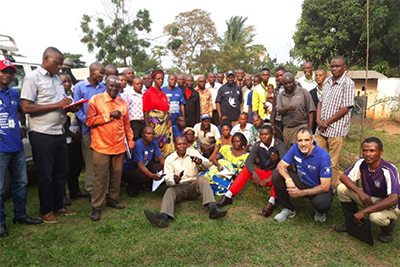
The U.S. Agency for International Development (USAID)-funded Budikadidi project in the Democratic Republic of the Congo is linking local needs to local solutions, building the foundation for a sustainable, resilient value chain that will flourish long after the project ends.
Implemented by NCBA CLUSA in partnership with Catholic Relief Services, Caritas Mbuji Mayi, Réseaux Femmes et Développement and Human Network International, Budikadidi aims to achieve food security, economic development and good governance outcomes for close to 600,000 participants in three rural areas of south-central DRC.
Recruiting Community-based Service Providers (locally called Agent Prestataires de Services Privés, or APSPs), has proven to be integral to the project’s success. By coupling their business skills with concern for community, APSPs are leading transformational change.
“APSPs are, first of all, ‘solution providers,’ driven by an inner entrepreneurial passion to provide solutions that will impact their communities positively,” said Perry Amitai, a business development consultant for NCBA CLUSA, who recently conducted an evaluation of the project.
These local entrepreneurs provide goods and services needed by farmers in their community such as seed, fertilizer, processing equipment and aggregation services. Depending on their skills and interests, APSPs have also become key players in their communities by:
- Supporting agricultural development
- Improving health and nutrition
- Forming savings and lending groups
- Making connections with microfinance institutions
- Providing water for sanitation and hygiene
- Acting as sanitation and hygiene ambassadors
While acting independently alongside the project, APSPs meet regularly with Budikadidi facilitators to provide critical information and help the project measure and evaluate their impact on the community. Many APSPs, like Terez Nseya, were already successful entrepreneurs before they were recruited by Budikadidi. They see the project as an opportunity to benefit from additional business training and work within a network that puts the needs of the community first. By participating in seminars organized by Budikadid, Terez was able to connect with more local producer growers to increase her supply.
“Terez is a perfect example for an APSP who was an active entrepreneur before the project started, and who… is more likely to succeed and keep being active even after the project ends,” Amitai said. And the long-term success of APSPs like Terez lends sustainability to the project interventions.
Two other APSPs, Godé Tchibitcheabu and Alumba Andrai, are also great examples of the resourceful and innovative approach the model brings to the project. A day after learning that hotels in nearby Mbuji-Mayi were interested in sourcing local produce instead of importing from the capital, Kinshasa, Godé had already sold tomatoes to the biggest hotel in the city and established a long-term business relationship with the hotel.
After learning about the need for toilets to promote hygiene through Budikadidi, Alumba decided to leverage his skills as a mason and builder while contributing to the social development of his village and the surrounding community. By marketing the toilet and the frame around it—not just the cement slab with a hole in it—he has already sold 48 toilet kits, while other dealers are struggling to sell just one slab.
Going forward, the project will continue efforts to build capacity and scale-up the APSP model.


